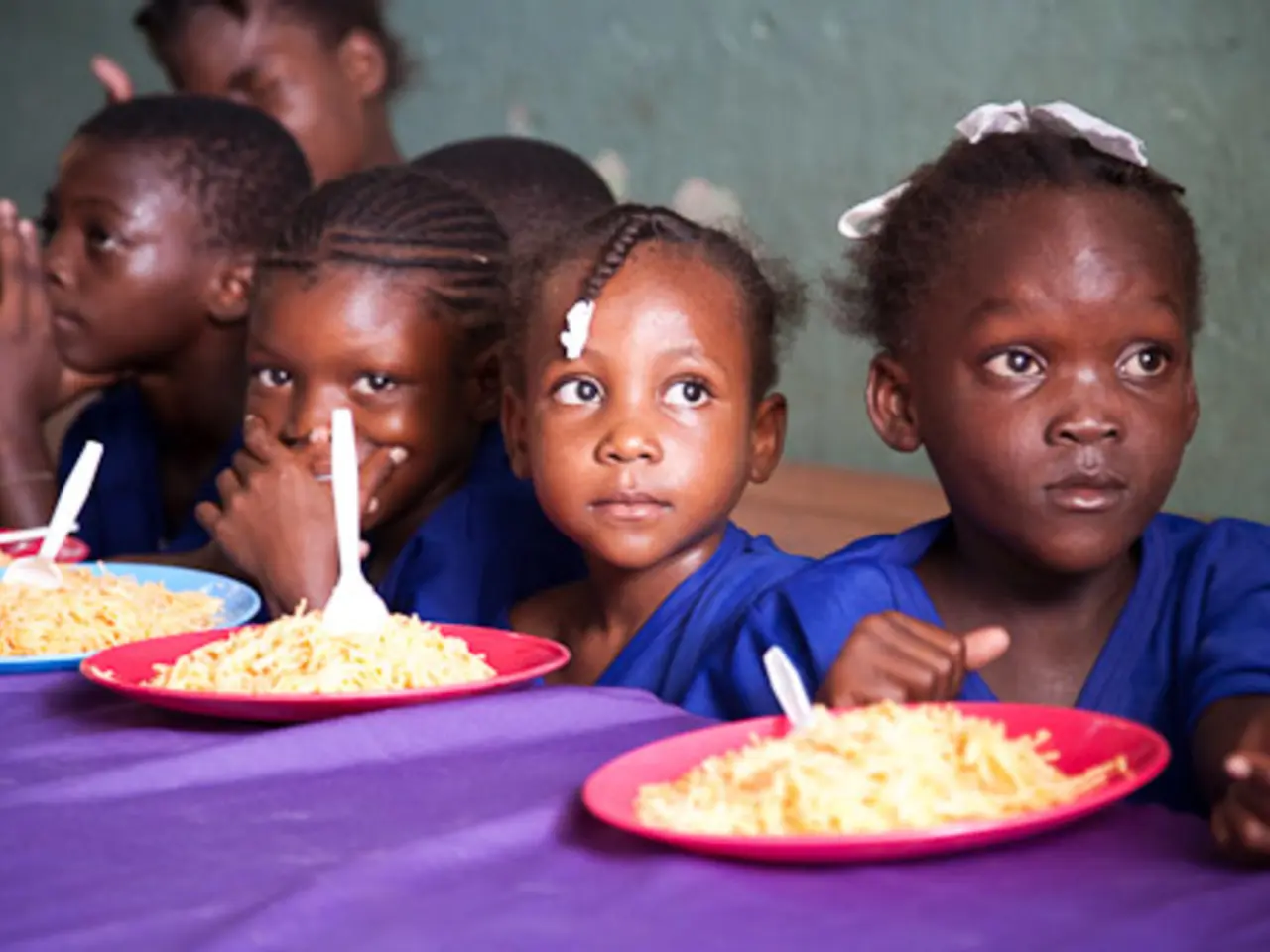Within Gaza's Nasser Hospital: Lack of Food Leaves Malnourished Children Starving
===============================================
In the war-torn region of Gaza, a humanitarian crisis is unfolding, with food access severely limited and malnutrition reaching alarming levels, particularly among children.
Huda, a 12-year-old girl, is a poignant example of the crisis. She points to a picture on her tablet, showing her before the war, visibly healthier than she is now. Her mother expresses a desperate need for fresh fruit, vegetables, fish, and a little meat, but these essentials are nowhere to be found in Gaza.
The food shortage in Gaza is not due to scarcity, but rather due to blockades and restrictions. The Israeli blockade, which has been ongoing since March, is a key factor. Israeli authorities control the entry of food, fuel, and medical supplies, with hundreds of aid trucks remaining stuck at border crossings awaiting permits.
The destruction of critical infrastructure, such as agricultural land, greenhouses, poultry farms, water, and electricity infrastructure, also limits local food production and affects clean water supply. This, coupled with the restricted humanitarian aid, worsens conditions for food preparation and health.
Aid distribution is often controlled by militarized schemes, such as the Gaza Humanitarian Foundation (GHF), which has been criticized for inefficiency and alleged manipulation. Only minimal food aid reaches the population, and civilians sometimes face danger or violence when attempting to access supplies.
Fuel shortages, resulting from the prohibition of fuel imports since March 2025, have paralyzed electricity generation, affecting cold storage of food, water desalination, and medical equipment. This indirectly aggravates food insecurity.
The consequences of these conditions are dire. Approximately one-third of the Gaza population is going without food for days, with about 100,000 women and children suffering severe acute malnutrition. Rising rates of acute malnutrition, unsafe water and poor sanitation, and the impact of war and blockade on healthcare further exacerbate the situation.
Dr Adil Husain, an American doctor, has treated patients in Gaza and believes the situation is man-made and preventable. He states that the starvation is intentional and deliberate, as the necessary feeds are right at the border but are being blockaded. A heart-wrenching example is three-year-old Amir, who was injured in an attack and is currently being given dextrose, a mixture of sugar and water, due to lack of proper food. Amir's mother and siblings were killed in the attack, and his father is no longer able to speak. Amir weighed only 6kg, a fraction of the 15kg he should be at his age, and sadly passed away two days after being examined by Dr Husain.
Israel denies identifying starvation as an issue. However, food is available at the crossings or held in warehouses within Gaza, but is not being distributed. Food is sometimes made available at communal kitchens called 'tikiya', but these are not enough to meet the needs of the population.
The United Nations is trying to organize convoys, but faces draconian restrictions on aid. Israel and the US have taken charge of the food distribution, with the UN's hundreds of aid centers shut.
Huda can only wish for a brighter future now. She knows she doesn't look well and attributes her condition to malnutrition. Like many others in Gaza, she is caught in a man-made crisis that could have been prevented.
[1] Al Jazeera, "Gaza food crisis: 'We are eating leaves and grass'," 2025. [2] Middle East Eye, "Gaza's food crisis: Palestinians forced to eat leaves and grass as Israel blocks aid," 2025. [3] UNICEF, "Gaza: Children's lives at risk due to ongoing humanitarian crisis," 2025. [4] The New York Times, "Gaza's Food Crisis Worsens as Israel Blocks Aid," 2025.
- The food crisis in Gaza has led to a significant increase in malnutrition, particularly among children, making it essential to focus on nutrition and health-and-wellness.
- In the midst of war-and-conflicts and politics, Gaza's humanitarian needs are an overlooked aspect of general-news, including the need for science and technology to address issues like agriculture, water supply, and renewable energy.
- The fitness-and-exercise routines of children in Gaza, sadly, take a backseat due to the lack of access to food and other essentials, highlighting the importance of maintaining mental-health during challenging times.
- The condition of Gaza exemplifies the dire consequences of war-torn regions, where the basic rights to food, healthcare, and freedom are heavily restricted, sparking discussions on politics and international relations.




